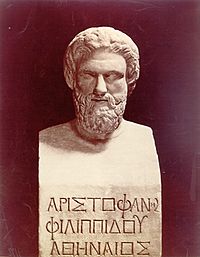Assemblywomen facts for kids
Quick facts for kids Assemblywomen |
|
|---|---|

Aristophanes
|
|
| Written by | Aristophanes |
| Chorus | Athenian Women |
| Setting | An Athenian street |
Assemblywomen (which means Ekklesiazousai in ancient Greek) is a funny play, also known as Congresswomen or Women in Parliament. It was written by the famous Greek playwright Aristophanes in 391 BC.
This play tells a made-up story where the women of Athens decide to take over the government. They want to make big changes, like getting rid of private wealth. Aristophanes wrote this play to make fun of and criticize the government of Athens at that time.
Characters in the Play
The dramatis personae means the characters in the play. Here are some of the main ones:
- Praxagora: An Athenian wife who leads the women.
- First Woman: A neighbor of Praxagora.
- Second Woman: Another neighbor of Praxagora.
- Blepyrus: Praxagora's husband.
- Neighbor: A neighbor of Blepyrus.
- Chremes
- Selfish Man
- Herald: A woman chosen by Praxagora.
- First Old Woman
- Girl
- Epigenes: A young man.
- Second Old Woman
- Third Old Woman
- Maid of Praxagora
There are also some silent characters like Sicon and Parmenon (neighbors' slaves) and two girls.
Why This Play Was Written
In the early 300s BC, Athens was going through a tough time. They had just finished a long war called the Peloponnesian War and were still fighting with Sparta. Even though Athens was trying to get stronger again, many people were very poor.
Because of this, people had different ideas about what Athens should do. Poor people often wanted war because it could mean jobs. Rich people wanted peace because war cost a lot of money. This made people feel worried and unsure about the future. Aristophanes used his play to show these feelings and to comment on the problems in Athenian society and its leaders.
The Longest Word Ever?
This play has the longest word in the ancient Greek language! It's so long that it's hard to say. Here it is:
In the Greek alphabet, it looks like this:
λοπαδοτεμαχοσελαχογαλεοκρανιολειψανοδριμυποτριμματοσιλφιοκαραβομελιτοκατακεχυμενοκιχλεπικοσσυφοφαττοπεριστεραλεκτρυονοπτοκεφαλλιοκιγκλοπελειολαγῳοσιραιοβαφητραγανοπτερύγων. (1169–74)
It's a word that describes a very long list of foods, like a giant stew! It includes things like limpets, shark, mullets, thrushes, pigeons, roosters, and even hare, all mixed with honey, vinegar, and spices. This Greek word has 171 letters! That's much longer than Shakespeare's 27-letter word, "honorificabilitudinitatibus".
See also
 In Spanish: Las asambleístas para niños
In Spanish: Las asambleístas para niños

